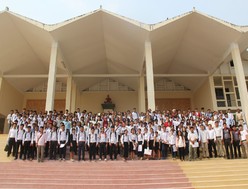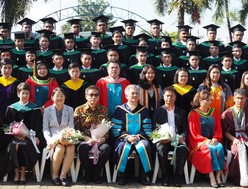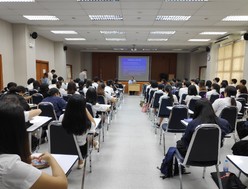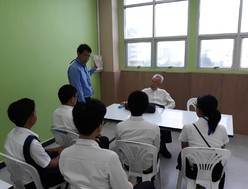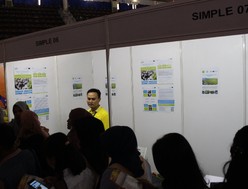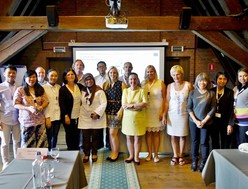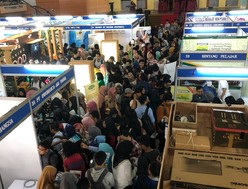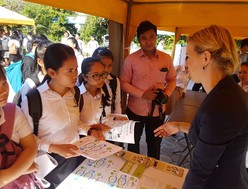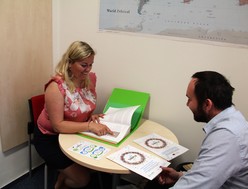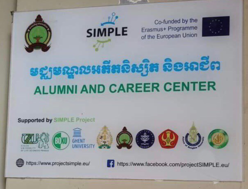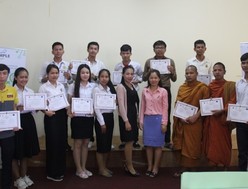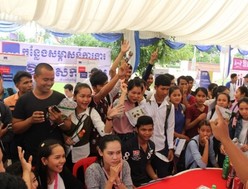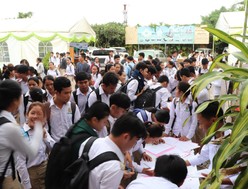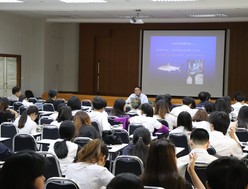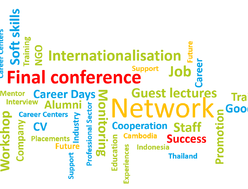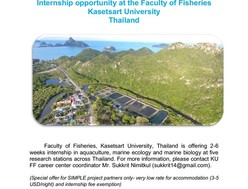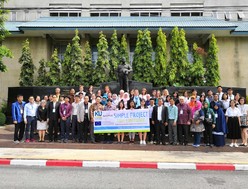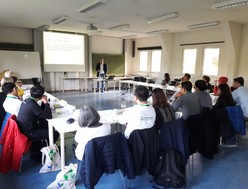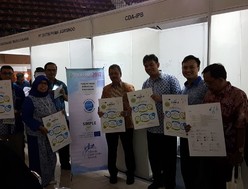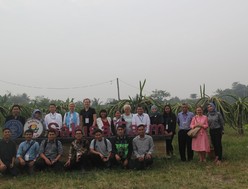Outcomes
please find detailed information in project SIMPLE publications
Project SIMPLE Publications
- Good Practices of Alumni Centres deals with the experience of Alumni and Career Centres. A set of specific best practices are identified, supported by examples of good practices.
- Guidelines Of Best Practice Examples for Alumni Centres provides step by step guidance for the setting up of Alumni and Career Centres
- Action Plan for Co-operation between Alumni Centres and the Non-academic Sector provides practical information for Alumni and Career Centres
- Internship Evaluation Report provides information about internships and improvements in Cambodia, Indonesia and Thailand
- FEASIBILITY STUDY OF ALUMNI AND CAREER CENTRES - PLATFORMS FOR COOPERATION WITH THE PROFESSIONAL SECTOR concludes outputs and lessons learnt from the SIMPLE project
Success Stories
- Tadulako University – internship
- video – appreciation of SIMPLE project by students´ and graduates´
Workshop
-
Best practices of Alumni and Career Centers was held at the Ghent University in Belgium in June 2017. Over three intensive days the project team focused on deep study of the best practices of Alumni and Career centers together with a number of outstanding international experts (e.g. INVE aquaculture, the University of Groningen, CASE and the University of Navarra provided detailed insights into their activities.)
Training Course
- Training course for the staff of Asian Alumni Centres was held in October 2017 at BOKU, Vienna University in Austria. Twenty four participants were trained over five intensive days in fields of service such as advertising, administration and internships by BOKU experts and developed a deep insight into events like Mentoring projects, Internship Days, How to Apply, Career Calling and Job Week which are traditionally held at BOKU University.
6 Newly Established or Improved Alumni/Career Centres
- Alumni and Career Centres were set up in all partner universities. Career Centres use the most suitable methods for cooperation and the involvement of future employers in academic activities through contacts with graduates, platforms for cooperation with the professional sector, events and by supporting internships, lectures from practitioners and the improvement of students‘ soft skills.
SIMPLE Project Platform
- The project SIMPLE Platform for Cooperation with Professional Sector is a complex platform connecting project partners, academic staff, administrative staff in universities, students and the professional sector. Cooperating with other Erasmus+ projects (e.g. PISAI, DOCKSIDE, FSCC), international organisations like Young Professionals for Agricultural Development (YPARD), the Agrinatura Association, and the Erasmus+ Student and Alumni Association (ESAA) ensures high international impact. Contributions to the project Platform for Cooperation with Professional Sector were set up with different organizations from both the governmental and non-governmental sectors as well as NGOs (Chambers of commerce, Embassies, Ministries, and the private sector with companies such as BETAGRO, C.P., etc.). Our database now contains more than 500 contacts in the professional sector. The main centres for this platform are the Alumni and/or Career Centres run in the Asian partner universities which are open for further cooperation even after project SIMPLE.
Improvement of Soft Skills
- Improvement of soft skills for students and staff was ensured by more than 230 trainings and active participation in project activities (Career Days, Trainings, Workshops, Guest lectures). Students enhanced their language, communication, and presentations skills. CV checks and mock interviews at international level were also provided for students at six Asian universities. During Career Days and other events students were actively involved in the preparation, thereby improving their management and organizational skills. Furthermore Soft skills lecture was newly developed and introduced at project partner´s universities.
Guest Lectures
- Guest lectures from more than 60 representatives of the professional sector relevant to various fields of study were provided at the project partners´ universities in Cambodia, Indonesia and Thailand. The project SIMPLE also supported international guest lectures.
16 Career Days
- Career Days were held at six universities: the Prince of Songkla University, Kasetsart University (Thailand), the Royal University of Agriculture, University of Battambang (Cambodia), Bogor University and Tadulako University (Indonesia). More than 300 major domestic and international companies and institutions doing business in the field of life sciences took part in sixteen Career Days and over 20,000 students were thus able to take this unique opportunity to establish contacts with potential employers and providers of professional internships (list of companies participated during Career Days and other activities).
Internships
- Internships instruction was summarized and model documents set up with the organization of internships as a running activity by way of a follow-up to the Career Days, based on the contacts of the Platform for Cooperation with the Professional sector. Project SIMPLE assessed the organization of partner universities’ internships and improved their quality of content and scope, vis-à-vis students, companies, the platform for cooperation, and the innovative approach with the Internship Buddy project.
Dissemination
- Promotion of project SIMPLE activities during various events such as conferences (Tropentag, Tropical Biodiversity Conservation Conference, NAFSA, USA), meetings, Round tables (Enhancement of agro-business activities in Cambodia, Forum for Development Cooperation), workshops, Career days, lectures and with other projects. Project results were disseminated to more than 20 countries.
Final Conference
- Final Conference of the SIMPLE project was held on 27 August 2019 at Kasetsart University in Bangkok, Thailand.Nearly 100 international participants got the opportunity to bridge the gap between academic and professional sector. Speakers and representatives from Embassies, Ministries, universities (staff, teachers, and students), other projects, governmental and private sector discussed their experiences from different perspectives and cross-border insight. During the fruitful Conference, project outcomes were presented by nine project representatives from universities in EU (Austria, Belgium, Czech Republic) and Asia (Cambodia, Indonesia, Thailand). Project SIMPLE has a positive impact on cooperation between universities and industry. At six Asian universities (Kasetsart University, Prince of Songkla University, Tadulako University, Bogor Agricultural University, University of Battambang, Royal University of Agriculture) were established or improved Alumni and Career Centres (AC/CC). The Platform for cooperation was created to guarantee an increase in the sustainable success of the involvement of future employers in academic activities. Project outputs in the field of AC/CC activities for platform extension, events (Career days), internships and soft skills trainings were step by step presented. Concluding three successful years of the SIMPLE project, lessons learnt and recommendations for the best practices for cooperation between academic and professional sector were shared. The outputs of the Final Conference, as well as results of the SIMPLE project, are available in the Final Study of the SIMPLE project
Lessons Learnt and Recommendations
- Universities are recommended to focus on the efficient operation and support of their Alumni & Career Centres (ACs & CCs), with professionally trained staff as one of their main priorities.
- To create a comprehensive platform for cooperation with the professional sector, with a focus on cooperation at both the national and international level, with strong promotion of AC/CC activities as the basis for success.
- Strong cooperation between AC and CC is one of the main strategies for the effective involvement of the professional sector.
- Efforts of AC/CC have to focus on maintaining a regularly updated database of alumni/companies and on the evaluation of activities with a strong need for flexibility and a focus on innovative approaches.
- The most effective activity is to regularly organize Career Days, rated as a most important event according to evaluations by students and companies. It is recommended to involve a wide range of activities to attract interest – benefits for sponsors, round tables, guest lectures, and CV checks.
- To have a strong focus on the soft skills training of the students as a main requirement of future employers. Highest importance should be given to communication, languages and problem solving seminars.
- The most effective way to turn theoretical knowledge into practice is via internships with recommended improvements in the field of extension of choice, promotion, quality, evaluation and skills of students involved in curriculum of study programmes.
- Support of International Platform Merging Labour and Education
- IPB Job fair
- GOOD PRACTICES OF ALUMNI CENTRES
- Action Plan for Co-operation between Alumni Centres and the Non-academic Sector
- Guidelines Of Best Practice Examples For Alumni Centres
- SIMPLE project Newsletter
- Soft Skills Training
- Internship Evaluation Report
- Feasibility Study of Alumni and Career Centres Platforms for Cooperation with the Professional Sector


